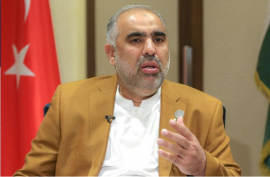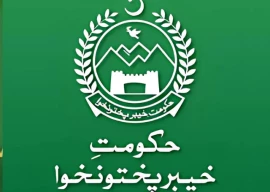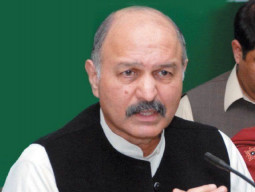
The Parliamentary Committee on National Security (PCNS), which drafted a 40-point proposal on terms of reengagement with the United States, is now considering a key opposition demand – to link the resumption of Nato supplies with a halt to drone strikes in tribal regions.
“This is our proposal … it will save us from public anger,” an opposition member told The Express Tribune after the PCNS session.
Opposition parties have refused to own the parliamentary panel’s proposal, objecting to key issues such as resumption of Nato supplies and US drone strikes.
The meeting of the multi-party, bicameral PCNS took place a day after top political leaders and military brass met in Islamabad where it was agreed that the recommendations would be reviewed.
The unusual huddle late Thursday night came after the revival of high-level contacts between civil and military leaderships of Pakistan and the US.
Officials say the main opposition party, the Pakistan Muslim League-Nawaz (PML-N), has agreed to most PCNS recommendations. But now it’s looking for some kind of ‘face-saving’ to avoid possible anger from its rightwing vote-bank.
“It appears they are looking for excuses now,” a PCNS member said about the PML-N whose chief Nawaz Sharif met with ambassadors of the US and the United Kingdom earlier in the day.
It wasn’t clear if the government itself endorses the proposal of unplugging Nato supply routes which were blocked after last year’s Nato air raid in Mohmand Agency that killed 24 soldiers. PCNS Chairperson Senator Raza Rabbani parried a question on the issue.
Meanwhile, the US is not willing to call off the drone campaign and officials said two top American commanders made this clear in their Wednesday’s meeting with Army chief Gen Ashfaq Parvez Kayani.
The PCNS has decided to drop proposals seeking transparency about the presence of foreign intelligence operatives in Pakistan and parliamentary oversight of foreign military bases here.
No deadline
Rabbani told journalists that the committee will meet on a daily basis – even on Sundays – to complete a review of its earlier recommendations by April 5 before the next sitting of parliament’s joint session.
However, it’s not a binding deadline, Senator Rabbani said, hinting at possible further delays in the completion of the process.
Maulana Fazlur Rehman, chief of his own faction of Jamiat Ulema-e-Islam, said that fresh amendments would contain a holistic review of the foreign policy and might not be limited to one specific issue of Nato supplies.
Rehman, whose party had threatened to resist resumption of Nato supplies, said that it was good that the military establishment and Gen Kayani were not influencing the foreign policy review to have a decision of their choosing.
The Muttahida Qaumi Movement (MQM), a coalition partner of the PPP-led government, said that instead of misleading the nation, the government needs to be ‘brave’ and tell the people the truth about drone strikes and Nato supplies.
In a statement, MQM chief Altaf Hussain said, “On the one hand, a joint session of parliament is called to gain an opinion on drone strikes and Nato supplies, but on the other hand, drone strikes are continuing.”
He also noted that the government was silent on the March 30 drone hit as no statement was issued to “condemn, oppose or support” the strike. He added resources should not be wasted on meetings just for the sake of it.
Altaf said religious and political parties also maintained a ‘criminal silence’, despite their threats to ‘respond’ to a drone strike in the future. He linked these parties to “mice who go back into their hideouts when there is a drone strike.”
(With additional reporting by our correspondent in Karachi)
Published in The Express Tribune, March 31st, 2012.
COMMENTS (7)
Comments are moderated and generally will be posted if they are on-topic and not abusive.
For more information, please see our Comments FAQ
1719315628-0/BeFunky-collage-(8)1719315628-0-405x300.webp)


1731329418-0/BeFunky-collage-(39)1731329418-0-165x106.webp)













For the foreseeable future, Pakistan is likely to continue to be enslaved by the United States. One of the American motives of invading and occupying Pakistan was to rein in Pakistan. But now this country is in such a level of US influence that its interests, sovereignty, and self-respect are undermined. Spies came in the garb of aid workers in the aftermath of the October 2005 earth quake. And, Pakistan cannot send them back and they are being replaced for those who went back. They would gather necessary information about Pak nuclear sites when times come they will coordinate an attempt to destroy Pakistan’s nuclear assets. US bases can also play a part. And, all that is part of the endgame in Afghanistan. (See: Magazine: Atlantic: The Ally from Hell.)
@M. Adil:
Well said Sir. Such straight talking is unfortunately very rare these days.
There were people who could foresee all this way back in the first half of 20th Century. They were there in India and also in what is now Pakistan. Just as no one listened to them, so will no one, very sadly, give an ear to you.
It will take more time to reach a decision then expected
What humble settings for a meeting of national leaders of a country that has a third of its population living below poverty line, one of the poorest countries in the world, a country living on aid from almost every institution and organisation that exists, which can't provide basic rights and services to its people. How can they possibly sit and talk amidst such grand and luxuriant settings when most of the country doesn't even have such basics as electricity, clean water, access to sanitation, basic medical facilities, justice and human rights? Don't they realise what, where, and which society they represent, and the realities which exists not a few miles away from such grandiose but totally unrepresentative environment - an environment which the ordinary man, woman and child sees only in news, magazines and billboards - if they're lucky enough to have access to such luxuries. What arrogance, what cynicism, what blindness, what lack of empathy for their fellow human beings. Rather than a meeting of national importance, it looks like a wedding banquet, with the bride and groom on the left! And then they don suitably humble clothes and stand in front of poverty stricken masses and pretend to be one of them; salt of the earth, fellow travellers and sufferers, crying their woes and promising roti, kaprra and .... well, they can certainly forget anything else these days. Shame on you, oh those residing and ruling from these palaces of opulance, which an ordinary fellow being may see only from afar or in images, but never in person. How dare you visit their humble abodes in your time of need and ask for their unlettered crosses on scraps of contrived paper. Yet in return you put up a thousand barrier to prevent them asking of their promised needs and basic rights. In reality, the foreign colonial masters have been merely replaced by native ones; at least the foreigners had the brains and the brass to build canals, barrages, roads and railway lines. There was relative law and order, justice, institutions and bureaucracy that functioned, at least better than the utter chaos and the decimation of every national institution that once existed in some shape or form. Well, at least the chosen few are sitting pretty, and isn't the bride looking so sweet? And the bouquets of flowers. Kaha hai na, zameen zarkhaiz hai, bus zara naam chahiyay!
Pakistan can do what it wants, but its foreign policy will ultimately be what the US demands. The fooling around may however continue for some more time.
What I find to be most interesting is PAK new demand about Iran. It now seems PAK wants to dictate US foreign policy and security. That seems kind of cheeky coming from PAK.
It would appear that PAK really does want to a full break of relations with the US. If that is so then that is what PAK should say.
They're not stopping. You know they aren't. If it's required then you already have your choice made. Announce it even if you have to buy a prosthetic backbone and get it over with.